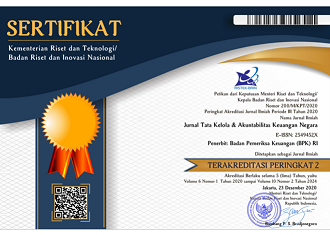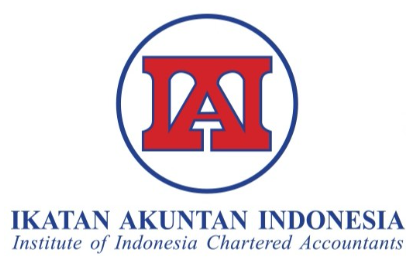Do internal controls improve integrity? A comparative study of central and regional governments
DOI:
https://doi.org/10.28986/jtaken.v11i1.2038Keywords:
Corruption, government agencies, integrity, integrated internal control systemAbstract
Integrity is a cornerstone of good governance; yet, its realization remains uneven across various levels of government in Indonesia. This study aims to compare the influence of integrated internal control system components—risk management, internal audit, internal control systems, and corruption control—on the integrity of central and regional government agencies. A quantitative approach is employed using Spearman’s rank correlation and panel data regression analysis on data from 42 central and 491 regional agencies collected between 2022 and 2023. Model selection is based on the Chow, Hausman, and Breusch–Pagan tests. The results show that in regional agencies, risk management, internal control systems, and corruption control significantly enhance integrity, while internal audit does not. Conversely, none of the control components show a significant effect on integrity in central agencies, indicating a gap between system maturity and actual governance outcomes. These differences reflect contextual challenges, including bureaucratic complexity, limited leadership engagement, and a compliance-oriented implementation approach. The study concludes that tailored strategies are needed to strengthen internal audits in regional agencies and to move beyond procedural compliance in central institutions. The study offers practical implications for improving public governance and contributes novel insights through its comparative approach across government levels.
References
Abdulhussein, A. S., Al-Refiay, H. A. N., & Wahhab, A. M. A. (2023). The impact of internal auditing on corruption: Evidence from the emerging market [Special issue]. Journal of Governance & Regulation, 12(1), 367–375. https://doi.org/10.22495/jgrv12i1siart15
Alam, M. M., Said, J., & Aziz, M. A. A. (2019). Role of integrity system, internal control system, and leadership practices on the accountability practices in the public sectors of Malaysia. Social Responsibility Journal, 15(7), 955-976. https://doi.org/10.1108/SRJ-03-2017-0051
Alwated, B. S., Shaheen, R., & Ahmed, M. (2024). The impact of controlling corruption on government effectiveness in GCC countries. International Journal of Advanced and Applied Sciences, 11(12), 1-12. https://doi.org/10.21833/ijaas.2024.12.001
Apriani, U. (2020). Pengaruh komponen-komponen fraud star terhadap korupsi dengan sistem pengendalian intern pemerintah (SPIP) sebagai variabel moderasi. Jurnal Magister Akuntansi Trisakti, 7(1), 1–24. https://doi.org/10.25105/jmat.v7i1.6311
Asnawi, M., Larasati, R., & Syahrir, A. (2023). Risk management and public service: Integrated analysis at the public sector organization. Jurnal Reviu Akuntansi Dan Keuangan, 13(3), 529-545. https://doi.org/10.22219/jrak.v13i3.26910
Bari, A. H. A., Abed, R. A., Kahdim, R. M., Hasan, H. F., Sharaf, H. K., & Alwan, A. S. (2024). The role of internal auditing in corruption control and enhancing corporate governance: A board of directors’ outlook. Corporate Board: Role, Duties and Composition, 20(2), 120-127. https://doi.org/10.22495/cbv20i2art12.
Basuki, A. T., & Prawoto, N. (2016). Analisis regresi dalam penelitian ekonomi dan bisnis. Rajawali Pers.
Bhul, B. (2023). The role of government auditing for combating corruption and promoting integrity in Nepal. Khwopa Journal, 5(2), 1–13. https://doi.org/10.3126/kjour.v5i2.60328
Bonrath, A., & Eulerich, M. (2024). Internal auditing’s role in preventing and detecting fraud: An empirical analysis. International Journal of Auditing, 28(4), 615-631. https://doi.org/10.1111/ijau.12342
BPKP Regulation Number 5 of 2021 concerning the Maturity Assessment of the Implementation of an Integrated Government Internal Control System at Ministries/Institutions/Regions (Peraturan Kepala BPKP Nomor 5 Tahun 2021 tentang Penilaian Maturitas Penyelenggaraan Sistem Pengendalian Intern Pemerintah Terintegrasi pada K/L/D). https://peraturan.bpk.go.id/Details/242786/peraturan-bpkp-no-5-tahun-2021
BPKP. (2021). Laporan kinerja Badan Pengawasan Keuangan dan Pembangunan. https://www.bpkp.go.id/id/informasiPublik/laporanKeuanganKinerja/kinerja/6
BPKP. (2022). Laporan kinerja Badan Pengawasan Keuangan dan Pembangunan. https://www.bpkp.go.id/id/informasiPublik/laporanKeuanganKinerja/kinerja/6
BPKP. (2023). Laporan kinerja Badan Pengawasan Keuangan dan Pembangunan. https://www.bpkp.go.id/id/informasiPublik/laporanKeuanganKinerja/kinerja/6
Bua, M. I., Karim, F., & Megawati, M. (2024). The influence of APIP capabilities in optimizing financial audit efficiency. Optimal Accountability. 2(1), 1788-1803. https://doi.org/10.21009/isc-beam.012.120
Dian, M. R., Fitriana, F., & Paramarta, V. (2024). Pengaruh SPIP dan good government governance terhadap pencegahan fraud dalam perencanaan dan penganggaran, anti fraud awareness sebagai pemoderasi di Kabupaten Purwakarta. Jurnal Review Pendidikan dan Pengajaran (JRPP), 7(4), 15781–15791. https://doi.org/10.31004/jrpp.v7i4.36847
Efendi, E., Bil’ibad, R. A., & Al Farisi, M. S. (2023). Konsep sistem, jenis-jenis sistem dan model sistem. Jurnal Pendidikan Dan Konseling (JPDK), 5(2), 3816–3820. https://doi.org/10.31004/jpdk.v5i2.13919
Endro, G. (2017). Menyelisik makna integritas dan pertentangannya dengan korupsi. Integritas: Jurnal Antikorupsi, 3(1), 131–152. https://doi.org/10.32697/integritas.v3i1.159
Gujarati, D. N., & Porter, D. C. (2009). Basic Econometrics 5th Edition. McGraw-Hill Companies.
Hauke, J., & Kossowski, T. (2011). Comparison of values of Pearson’s and Spearman’s correlation coefficients. Quaestiones Geographicae, 30(2), 87-93. https://doi.org/10.2478/v10117-011-0021-1
ICW. (2024). Laporan hasil pemantauan tren penindakan korupsi tahun 2023. https://www.antikorupsi.org/sites/default/files/dokumen/Narasi%20Laporan%20Hasil%20Pemantauan%20Tren%20Korupsi%20Tahun%202023.pdf
Indrasetianingsih, A., Wasik, K., & Surabaya, A. B. (2020). Model regresi data panel untuk mengetahui faktor yang mempengaruhi tingkat kemiskinan di Pulau Madura. Jurnal Gaussian, 9(3), 355–363. https://doi.org/10.14710/j.gauss.9.3.355-363
Ismaya, N., Mustafa, L. O., & Jopang. (2022). Efektivitas pelayanan publik diukur dengan pendekatan teori sistem pada Dinas Pekerjaan Umum dan Penataan Ruang Kabupaten Buton Utara. Jurnal Administrasi Pembangunan dan Kebijakan Publik, 13(1), 99-107. https://journal.uho.ac.id/index.php/publica/article/view/68
Jati, I. K. (2019). Pengaruh pengawasan melekat dan pemeriksaan internal terhadap pencegahan fraud pada dana hibah. Jurnal Akuntansi, 14(2), 80-91. https://doi.org/10.37058/jak.v14i2.1235
Johari, R. J., Alam, M. M., & Said, J. (2021). Empirical assessment on factors contributing to integrity practices of Malaysian public sector officers. Business Process Management Journal, 27(4), 1217-1237. https://doi.org/10.1108/BPMJ-06-2020-0297
Kementerian Koordinator Bidang Perekonomian & Komite Nasional Kebijakan Governansi. (2022). Pedoman Umum Governansi Sektor Publik Indonesia (PUG-SPI). https://knkg.or.id/wp-content/uploads/2022/06/PUGSPI-2022-LORES.pdf
Kifflee, S. N. F., Nawi, H. M., Jusoh, M. A., Mohaiyadin, N. M., & Abdullah, M. N. (2023). The impact of internal audit effectiveness on public sector governance. International Journal of Academic Research in Accounting, Finance & Management Sciences, 13(3), 654-665. https://doi.org/10.6007/IJARAFMS/v12-i3/19501
Kholikulovna, K. Y. (2022). Corruption is a dangerous crime for society. European International Journal of Multidisciplinary Research and Management Studies, 2(6), 23-28. https://doi.org/10.55640/eijmrms-02-06-05
KPK. (2024). Survei penilaian integritas tahun 2021-2023. http://www.jaga.id
KPK. (2025, January 24). SPI 2024: Skor merah jadi pekerjaan yang harus diselesaikan Pemda. KPK. https://kpk.go.id/id/ruang-informasi/berita/spi-2024-skor-merah-jadi-pekerjaan-rumah-yang-harus-diselesaikan-pemda
Law Number 20 of 2021 concerning Amendments to Law Number 31 of 1999 concerning the Eradication of Criminal Acts of Corruption (Undang-Undang Nomor 20 Tahun 2021 tentang Perubahan atas Undang-Undang Nomor 31 Tahun 1999 tentang Pemberantasan Tindak Pidana Korupsi). https://peraturan.bpk.go.id/Details/44900/uu-no-20-tahun-2001
Lillo, R. L., & Torrecillas, C. (2018). Estimating dynamic panel data: A practical approach to perform long panels. Revista Colombiana de Estadística, 41(1), 31–52. https://doi.org/10.15446/rce.v41n1.61885
Lewis, C. W., & Gilman, S. C. (2005). The ethics challenge in public service: A problem-solving guide. Jossey-Bass.
Linda, D. A., Winoto, J., & Suprehatin, S. (2024). Strategi pencegahan korupsi untuk menurunkan tingkat korupsi daerah. Jurnal Aplikasi Bisnis Dan Manajemen, 10(1), 251-262. https://doi.org/10.17358/jabm.10.1.251
Lonto, M. P., Sukoharsono, E. G., Baridwan, Z., & Prihatiningtias, Y. W., (2023). The effectiveness of internal audit for fraud prevention. Australasian Accounting, Business and Finance Journal, 17(3), 171–190. https://doi.org/10.14453/aabfj.v17i3.11
Marnani, C. S., Saputro, G. E., & Muliansyah, P. (2023). The role of the government’s internal supervisory apparatus in preventing corruption in Indonesia. International Journal of Progressive Sciences and Technologies, 39(2), 219-225. https://doi.org/10.52155/ijpsat.v39.2.5443
Memon, M. A., Ramayah, T., Ting, H., & Cheah, J. (2024). Purposive sampling: A review and guidelines for quantitative research. Journal of Applied Structural Equation Modelling, 9(1), 1–23. https://doi.org/10.47263/jasem.9(1)01
Nopirina, N. (2023). Urgent APIP in the implementation of bureaucracy innovation to establish quality of maintenance free of corruption, collusion, and nepotism. International Journal of Multicultural and Multireligious Understanding, 10(9), 25–36. https://doi.org/10.18415/ijmmu.v10i9.5045
Nurhasanah. (2016). Efektivitas pengendalian intern, audit internal, karakteristik dan kasus korupsi (studi empiris di kementerian/lembaga). Jurnal Tata kelola dan Akuntabilitas Keuangan Negara, 2(1), 27-48. https://doi.org/10.28986/jtaken.v2i1.35
Oktavia, M. H. (2018). Pengaruh integritas, kerahasiaan, kompleksitas tugas, motivasi dan ketidakjelasan peran terhadap kinerja auditor di Inspektorat Provinsi Jawa Tengah. Jurnal Akuntansi Bisnis, 16(2), 161-179. https://doi.org/10.24167/jab.v16i2.2253
Permana, K., & Bujana, C. C. A. (2024). Examining the efforts of Government Internal Supervisory Apparatus (APIP) in enhancing bureaucratic reform, organizational integrity, and risk management: An efficiency analysis. Integritas: Jurnal Antikorupsi, 10(1), 107-122. https://doi.org/10.32697/integritas.v10i1.1144
Priyarsono, D. S. (2022). Urgensi dan strategi implementasi manajemen risiko di sektor publik. Policy Brief Pertanian, Kelautan, dan Biosains Tropika, 4(1), 248-251. https://doi.org/10.29244/agro-maritim.0401.249-251
Pujileksono, S., & Siregar, M. (2022). Pemahaman korupsi dalam teori pilihan rasional dan hubungan prinsipal-agen. Jurnal Ilmu Sosial dan Ilmu Politik, 2(2), 139-151. http://dx.doi.org/10.30742/juispol.v2i2.2592
Putra, N. R., & Linda, R. (2022). Corruption in Indonesia: A challenge for social changes. Integritas: Jurnal Antikorupsi, 8(1), 13–24. https://doi.org/10.32697/integritas.v8i1.898
Puteri, P. (2023). Internalisasi dan implementasi integritas aparatur sipil negeri – Sebuah pendekatan holistik. Civil Service Journal, 17(1), 53–77. https://doi.org/10.61133/pns.v17i1.414
Rakhmanto, B., Masyhudzulhak, M., & Saluy, A.B. (2021). Pengaruh kepemimpinan dan integritas terhadap kinerja organisasi dengan komitmen organisasi sebagai variabel intervening (Studi kasus pada Komisi Pemberantasan Korupsi). Jurnal Indikator, 5(3), 1-16. http://doi.org/10.22441/indikator.v5i1.11239
Reschiwati., & Aryanty, S. N. (2024). Independensi auditor, struktur corporate governance, dan kualitas audit: Implikasinya pada integritas laporan keuangan. Jurnal Riset Akuntansi dan Auditing, 11(1), 45-63. https://doi.org/10.55963/jraa.v11i1.638
Sandu, A. (2016). Integrity as the ethical operational value in public administration. Revista Romaneasca pentru Educatie Multidimensionala, 8(2), 57-67. https://doi.org/10.18662/rrem/2016.0802.05
Saputra, R., & Firmansyah, A. (2024). Memperkuat independensi auditor APIP: Kunci pencegahan korupsi dan kualitas audit unggul. Jurnalku, 4(4), 447–458. https://doi.org/10.54957/jurnalku.v4i4.1182
Sari, F. N., Gamayuni, R. R., Dewi, F. G., & Metalia, M. (2024). The effect of the government internal control system on corruption potential with accountability as an intervening variable (Study on regency/city governments in Indonesia). International Journal of Economics, Management and Accounting, 1, 341-357. https://doi.org/10.61132/ijema.v1i2.117
Sari, M. (2022). Pengaruh integritas, obyektivitas, dan kompetensi terhadap kinerja Aparat Pengawasan Intern Pemerintah (APIP) dengan budaya organisasi sebagai variabel moderasi pada inspektorat daerah Kabupaten Asahan. JRAK (Jurnal Riset Akuntansi Dan Bisnis), 8(2), 152–162. https://doi.org/10.38204/jrak.v8i2.978
Sari, N., Ghozali, I., & Achmad, T. (2017). The effect of internal audit and internal control system on public accountability: The emperical study in Indonesia state universities. International Journal of Civil Engineering and Technology, 8(9), 157-166.
Sihombing, R. P., Soewarno, N., & Agustia, D. (2023). The mediating effect of fraud awareness on the relationship between risk management and integrity system. Journal of Financial Crime, 30(3), 618-634. https://doi.org/10.1108/JFC-02-2022-0058
Sofia, I. P. (2018). Pengaruh komite audit terhadap integritas laporan keuangan dengan whistleblowing system sebagai variabel moderasi. Jurnal Riset Akuntansi Terpadu, 11(2), 192-207. https://doi.org/10.35448/jrat.v11i2.4260
Sulistiyo, A., & Yanti, H.B. (2022). Pengaruh pengendalian internal, manajemen risiko dan wistleblowing system terhadap pencegahan fraud. Jurnal Akuntansi dan Pajak, 23(01), 1-11. https://doi.org/10.29040/jap.v23i1.6016
Suyono. (2022). Kajian literatur: Konsep integritas bagi ASN. CENDEKIA: Jurnal Ilmu Pengetahuan, 2(3), 247-260. https://doi.org/10.51878/cendekia.v2i3.1479
Umar, G. A., Adam, I. O., Alhassan, M. D., Abdallah, A. S., & Nterful, J. (2025). Mediating role of political interest on effects of internal control systems on financial management in local government authorities in Ghana. Accounting Research Journal, 38(1), 59-79. https://doi.org/10.1108/ARJ-09-2023-0242
Weruin, U. U. (2019). Teori-teori etika dan sumbangan pemikiran para filsuf bagi etika bisnis. Jurnal Muara Ilmu Ekonomi dan Bisnis, 3(2), 313-322. https://doi.org/10.24912/jmieb.v3i2.3384
Wibisono, G. (2024, Juli 8). KPK bersama BPKP dan Kemendagri perkuat APIP untuk mencegah korupsi di pemerintah daerah. https://www.bpkp.go.id/id/siaranPers/BKv/kpk-bersama-bpkp-dan-kemendagri-perkuat-apip-untuk-mencegah-korupsi-di-pemerintah-daerah.
Wihatmono, S. R., Suharman, H., & Daryanto. (2025). The influence of organizational culture on the government's internal control system and its impact on the quality of financial information systems in the regional revenue agency of West Java Province. Journal of Ecohumanism, 4(1), 2140-2155. https://doi.org/10.62754/joe.v4i1.6004
Zabar, T. (2022, February 7). Korupsi kepala daerah. https://antikorupsi.org/id/korupsi-kepala-daerah
Downloads
Submitted
Accepted
Published
How to Cite
Issue
Section
License
Copyright (c) 2025 Jurnal Tata Kelola dan Akuntabilitas Keuangan Negara

This work is licensed under a Creative Commons Attribution-ShareAlike 4.0 International License.

Jurnal Tata Kelola dan Akuntabilitas Keuangan Negara is licensed under
a Creative Commons Attribution-ShareAlike 4.0 International License





















